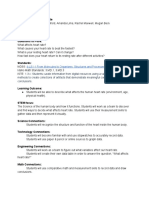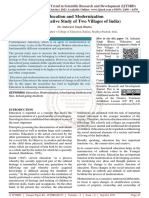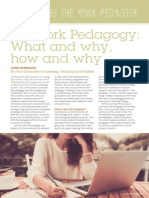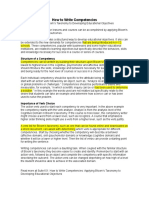SIT ICE Program Overview - V5.april 2023
SIT ICE Program Overview - V5.april 2023
Uploaded by
Nico LaiCopyright:
Available Formats
SIT ICE Program Overview - V5.april 2023
SIT ICE Program Overview - V5.april 2023
Uploaded by
Nico LaiOriginal Title
Copyright
Available Formats
Share this document
Did you find this document useful?
Is this content inappropriate?
Copyright:
Available Formats
SIT ICE Program Overview - V5.april 2023
SIT ICE Program Overview - V5.april 2023
Uploaded by
Nico LaiCopyright:
Available Formats
ICE I am a Clinical Educator
INTRODUCTION:
“I am a Clinical Educator”, ICE, is a 2-day workshop developed by SIT for SIT Clinical Educators
(CEs). The aims of ICE workshop are to:
1. Prepare Allied Health professionals to support SIT student learning at clinical sites,
2. Equip Allied Health professionals with competencies of an effective clinical educator, and
3. Enhance the professional development of Allied Health clinical educators.
ICE consists of a 2 days workshop with an assessment component to enhance CEs’ capabilities in
facilitating student’s learning during clinical practice education (CPE).
Since the commencement of ICE from January 2017 till January 2023, SIT has conducted 49 runs
of ICE workshops and trained more than 2000 Allied Health Professionals. There has been
continuous evolution of the programme to cater to the learning needs of the growing pool of
clinical educators.
• In April 2020, the mode of delivery of ICE was revised from face-to-face workshop to
virutal facilitation with online learning and assessment.
• In ICE 50 on February 2023, content on collaborative learning in facilitating more than 1
student clinical placement was introduced.
To-date, ICE continues to be a pre-requisite for SIT appointed Clinical Educators.
ENTRY REQUIREMENTS:
Allied Health professionals nominated by their departments and shortlisted by SIT based on SIT
CE criteria.
LEARNING OUTCOMES:
1. Perform the roles and responsibilities of a SIT Clinical Educator.
2. Evaluate student’s performance against profession-specific assessment criteria.
3. Facilitate optimal learning in clinical education through selecting appropriate educational
approaches.
4. Apply skills in effective teaching, giving feedback and promoting reflective practice in students.
5. Develop an approach to manage challenging situations during clinical placements.
6. Develop confidence to facilitate collaborative learning between two or more students.
EDUCATIONAL METHOD:
The ICE workshop is delivered through a series of lectures, discussions, case studies, role plays,
peer learning and feedback, and self-reflection.
ICE Workshop Overview v5 / Apr 2023 1
ICE I am a Clinical Educator
OVERVIEW:
DAY 1 - ICE Foundational Training
This is a 1 day inter-professional foundational training workshop to develop and enhance CE’s
core knowledge and skills in facilitating student’s learning.
All shortlisted CEs are encouraged to attend this workshop. Experienced CEs can request for
waiver of Day 1 in CE Application form.
DAY 2 - ICE Profession-Specific Orientation
This is a ¾ day profession-specific orientation to familiarise CEs with specific administrative
functions as a SIT CE. All shortlisted CEs are to attend this workshop.
ICE Assessment
Day 1 – There is a ½ hour MCQ to assess the shortlisted CE’s clinical education knowledge in
facilitation of students learning and roles and responsibilities of SIT CE.
Day 2 – There is a ½ hour Objective Structured Teaching Exercise (OSTE) to assess the shortlisted
CE’s application of clinical education skills in typical CPE situations. An assessor will observe the
shortlisted CE interact with two standardized students using skills learnt during the workshop
and provide feedback for CE’s future development.
All shortlisted CEs are to pass both assessments before appointed as SIT Clinical Educator.
Note: Preparatory materials will be available to those exempted from Day 1 ICE Foundational Training.
CERTIFICATION:
A Certificate of Achievement will be awarded to shortlisted CEs who have met ALL the course
requirements as follow:
1. Complete pre-workshop survey and post-workshop feedback
2. 100% course attendance on both days of ICE (except those who have exemption from Day 1)
3. Demonstrate adequate knowledge in MCQ of 75% within three attempts
4. Demonstrate adequate skills performance in OSTE
Certificate of Attendance will be awarded to shortlisted CEs who met 1 and 2.
ICE Workshop Overview v5 / Apr 2023 2
ICE I am a Clinical Educator
DAY 1: ICE FOUNDATIONAL TRAINING
NOTE: Please complete the pre-workshop survey and MCQ by 1pm on Day 1
Estimated Time Focus of Section
9am to 1pm: Self-directed learning via lectures, readings, learning activities and MCQ
9 – 9.30am Section 1: Becoming a SIT Clinical Educator
• Introduction to SIT, ICE workshop, Health Science Clinical Practice
Education (CPE) and roles and responsibilities of SIT Clinical Educator.
9.30 – 10 am Section 2: Educational theories
• Educational theories and principles in clinical education.
• Cognitive apprenticeship: a roadmap for clinical teaching.
10 -10.15am BREAK
10.15– 11.30am Section 3: Educational knowledge and skills
• Four-step approach to teaching practical skills.
• Giving feedback and facilitating reflection using Pendleton model.
• The “What”, “What”, “How” in facilitating collaborative learning.
11.30am– 12.15pm Section 4: Managing challenging situations during clinical placement
• Using PAAR approach to manage challenging situations.
• Having a crucial conversation.
12.15 – 12.45pm ICE Knowledge Assessment via MCQ
12.45 -2pm LUNCH BREAK
2pm to 5pm: Facilitator guided co-learning via group discussions and role plays
2pm - 2.15pm Introduction and orientation to ICE
2.15pm – 3.15pm Breakout Group 1:
Role play of giving feedback using Pendleton model – Role play
3.15pm – 4.20pm Breakout Group 2:
[Break: 3.50 – 4pm] Collaborative learning discussion – Padlet platform
4.20pm – 5.20pm Breakout Group 3:
Role play of crucial conversation using PAAR framework – Role play
5.20pm – 5.30pm Big group debrief of Day 1
DAY 2 PROGRAMME: ICE PROFESSION-SPECIFIC ORIENTATION
Profession-specific orientation may happen in AM or PM depending on OSTE schedule. Please refer to profession-
specifice lesson plans.
NOTE: Please complete the post-workshop survey by 6pm on Day 2.
ICE Workshop Overview v5 / Apr 2023 3
ICE I am a Clinical Educator
References for ICE program Day 1
General references:
• Enabling Clinical Supervision Skills (ECSS) NSW North Coast ICTN Learning Package: Retrieved from
http://www.clinedaus.org.au/files/resources/enabling_clinical_supervision_skills_ecss_3.pdf
• Health Education and Training Institute (2012). The superguide: a handbook for supervising allied
health profesisonals, HETI, Sydney
• Ramani S & Leinster S (2008). AMEE guide no.34: Teaching in the clinical environment. Med Teach.
30(4):347-64. doi: 0.1080/01421590802061613.
• Taylor DC & Hamdy H (2013) Adult learning theories: implications for learning and teaching in
medical education: AMEE Guide No. 83. Med Teach 35(11):e1561-72.
doi:10.3109/0142159X.2013.828153.
• TAFE NSW North Sydney Institute (2013). Continuous improvement and innovation in clinical
supervision for supervisors in aged and non-acute healthcare settings. Retrieved from
http://www.heti.nsw.gov.au/Global/ICTN/Local%20Projects%20Pages/Metro%20North%20and%20
East%20ICTN/Supporting%20Clinical%20Supervision%20Workshop%20Handbook%205%20and%206
%20(MNE7).pdf
Learning styles:
• Humford P & Mumford A (2000). The learning styles helper’s guide from
http://www.nwlink.com/~donclark/hrd/styles/honey_mumford.html
• VARK learning style from https://www.mindtools.com/pages/article/vak-learning-styles.htm
Cognitive Apprenticeship:
• Collins, A., Brown, J., & Newman, S. (1989). Cognitive apprenticeship: Teaching the crafts of reading,
writing, and mathematics Knowing, learning, and instruction: Essays in honor of Robert Glaser (In L.
B. Resnick (Ed.) ed., pp. 453-494). Hillsdale, New Jersey: Lawrence Erlbaum Associates, Inc.
• Stalmeijer, R.E., Dolmans, D.H.J.M., Wolfhagen, I.H.A.P., & Scherpbier, A.J.J.A. (2009). Cognitive
apprenticeship in clinical practice: can it stimulate learning in the opinion of students? Advances in
health sciences education, 14(4), 535-546.
ICE Workshop Overview v5 / Apr 2023 4
ICE I am a Clinical Educator
• Stalmeijer, R.E., Dolmans, D.H.J.M., Wolfhagen, I.H.A.P., Peters, W.G., van Coppenolle, L., &
Scherpbier, A.J.J.A. (2010). Combined student ratings and self-assessment provide useful feedback
for clinical teachers. Advances in Health Sciences Education: Theory and Practice, 15(3), 315-328.
• Stalmeijer, R.E., Dolmans, D.H.J.M., Snellen-Balendong, H.A.M., van Santen-Hoeufft, M., Wolfhagen,
I.H.A.P., & Scherpbier, A.J.J.A. (2013). Clinical Teaching Based on Principles of Cognitive
Apprenticeship: Views of Experienced Clinical Teachers. Academic Medicine, 88(6), 861-865.
Clinical teaching and feedback skills:
• Lake F & Ryan G (2004). Teaching on the run tips 3: Planning a teaching episode. Medical Journal of
Australia, 180: 643-644
• Lake F & Hamdorf J (2004). Teaching on the run tips 5: Teaching a skill. Medical Journal of Australia,
181 (6): 327-328.
• Hattie J & Timperley H (2007). The power of feedback. Review of Educational Research, 77: 81
• Cantillon J & Sargeant J (2008). Giving feedback in clinical settings. BMJ 337, 1292-1294
Managing student’s challenging behaviours:
• ClinEdu Australia website http://www.clinedaus.org.au/topics-category/managing-difficult-
situations-48)
• Ken Bain, What the Best College Teachers Do, Harvard University Press, 2004, pages 32-33, adapted
from Vanderbilt University Centre for Teaching. Accessed online: https://cft.vanderbilt.edu/guides-
sub-pages/motivating-students/ 30 Dec 2016
• Health Workforce Australia (2013). Retrieved from
https://www.health.gov.au/internet/main/publishing.nsf/Content/D26858F4B68834EACA257BF000
1A8DDC/$File/Review%20of%20Health%20Workforce%20programs.pdf
ICE Workshop Overview v5 / Apr 2023 5
You might also like
- Edm 330 Assignment 3Document7 pagesEdm 330 Assignment 3baloyimaggie44No ratings yet
- Edited ResumeDocument4 pagesEdited Resumeapi-736829863No ratings yet
- Learner GuideDocument62 pagesLearner Guidegodidendlela95No ratings yet
- IM SEL MockUpDocument6 pagesIM SEL MockUpyogitha dadiNo ratings yet
- scn600 Consulting SarahltDocument11 pagesscn600 Consulting Sarahltapi-644817377No ratings yet
- Raha International School - Improvement PlanDocument2 pagesRaha International School - Improvement PlanfarraheshamNo ratings yet
- Fostering Metacognition To SupportDocument7 pagesFostering Metacognition To SupportAnabel Espitia CamposNo ratings yet
- Prue Barnes-KempDocument16 pagesPrue Barnes-Kempapi-327445428No ratings yet
- Nursing Students' Perceptions Towards Flipped Classroom Educational Strategy.Document14 pagesNursing Students' Perceptions Towards Flipped Classroom Educational Strategy.Mariana Nannetti100% (1)
- Lesson Plan For Moi AssessmentsDocument3 pagesLesson Plan For Moi Assessmentsapi-321133568No ratings yet
- PNSG Table - LDocument17 pagesPNSG Table - Lapi-457773521No ratings yet
- Nurs 605 Learning Contract Final Copy For Submission April 21Document10 pagesNurs 605 Learning Contract Final Copy For Submission April 21api-323169345No ratings yet
- Scientific Method Teachers Guide Discovery EducationDocument31 pagesScientific Method Teachers Guide Discovery EducationKari Kristine Hoskins Barrera100% (1)
- Hse3704 EportfolioDocument21 pagesHse3704 Eportfolioapi-284696236100% (1)
- El 5623 Module 4Document6 pagesEl 5623 Module 4api-288414853100% (1)
- Educator Positionality PaperDocument5 pagesEducator Positionality Paperapi-391071731No ratings yet
- Course OutlineDocument14 pagesCourse Outline洪卓澧No ratings yet
- (Prelim) - Educational Reforms (The K-12 Curriculum Example)Document7 pages(Prelim) - Educational Reforms (The K-12 Curriculum Example)nicolai cortesNo ratings yet
- KBSR & KSSR Answer N Question (Philosophy of Education) Pismp Sem 1Document7 pagesKBSR & KSSR Answer N Question (Philosophy of Education) Pismp Sem 1Khadijah ElamoreNo ratings yet
- Graduate Program Student Learning OutcomesDocument16 pagesGraduate Program Student Learning Outcomesapi-333668902No ratings yet
- 8617 Assignment 2-1Document21 pages8617 Assignment 2-1Laa BelaNo ratings yet
- hw499 Unit 2 AssignmentDocument4 pageshw499 Unit 2 Assignmentapi-743852994No ratings yet
- LBB Lesson Plan Upper PrimaryDocument13 pagesLBB Lesson Plan Upper Primaryapi-273743090100% (1)
- M EdDocument34 pagesM EdSunny PKNo ratings yet
- Cbe and ObeDocument9 pagesCbe and ObeSmruti rekha SahooNo ratings yet
- 5e Lesson PlanDocument4 pages5e Lesson Planapi-569849927No ratings yet
- Education and Modernization A Comparative Study of Two Villages of IndiaDocument6 pagesEducation and Modernization A Comparative Study of Two Villages of IndiaEditor IJTSRDNo ratings yet
- Guide To Review of Basic Nursing Curriculum (WHO) PDFDocument53 pagesGuide To Review of Basic Nursing Curriculum (WHO) PDFLliryc Sotnas OleusnocNo ratings yet
- Phase 1 Learner WorkbookDocument126 pagesPhase 1 Learner Workbookwalter chitsikeNo ratings yet
- The York Pedagogy: What and Why, How and WhyDocument16 pagesThe York Pedagogy: What and Why, How and Whyyorkforum100% (1)
- How To Write CompetencesDocument3 pagesHow To Write Competencesapi-316763559100% (1)
- Assignment 2 - HBEF 3203Document4 pagesAssignment 2 - HBEF 3203Norhezrine OthmanNo ratings yet
- Assignment 8601Document24 pagesAssignment 8601arifiqra246100% (1)
- Leadership LessonDocument5 pagesLeadership Lessonapi-449956571No ratings yet
- Mitchell, John, Educ 240, P e Observation ReportDocument6 pagesMitchell, John, Educ 240, P e Observation Reportapi-277927821No ratings yet
- An Overview of Early Childhood Care and Education in PakistanDocument47 pagesAn Overview of Early Childhood Care and Education in PakistanM.S.Waseem.LangrialNo ratings yet
- Definition of Instructional SupervisionDocument1 pageDefinition of Instructional SupervisionMuriel Comeros100% (1)
- Resume DoneDocument2 pagesResume DoneO. I.No ratings yet
- SBX22ES - UNIT 2 - ScaffoldingDocument17 pagesSBX22ES - UNIT 2 - ScaffoldingThendo ManngoNo ratings yet
- Gned 129 2012-04Document6 pagesGned 129 2012-04Patel HirenNo ratings yet
- Pfo Assignment 3 2024Document6 pagesPfo Assignment 3 2024baloyimaggie44No ratings yet
- EDUC4185 Assignment 2Document9 pagesEDUC4185 Assignment 2DavidNo ratings yet
- Py1103 SP53 2019Document17 pagesPy1103 SP53 2019shaniNo ratings yet
- The Changing Face of Medical Education in Egypt Introducing The First Issue of "The Egyptian Journal of Medical Education".Document2 pagesThe Changing Face of Medical Education in Egypt Introducing The First Issue of "The Egyptian Journal of Medical Education".The Egyptian Journal of Medical EducationNo ratings yet
- Transforming Medical EducationDocument3 pagesTransforming Medical EducationMob Man3No ratings yet
- Curriculum Development NotesDocument89 pagesCurriculum Development Notesgoldprideenterprises79No ratings yet
- Standard 7 ArtifactDocument2 pagesStandard 7 Artifactapi-286082163No ratings yet
- Format Tugas Review Artikel BKDocument6 pagesFormat Tugas Review Artikel BKIka Maulidiyah RahmahNo ratings yet
- Types of Curriculum Design: TopicDocument9 pagesTypes of Curriculum Design: TopicZina BestunNo ratings yet
- Competency Based CurriculumDocument1 pageCompetency Based Curriculumprudence ivotu100% (1)
- (8615) 1Document28 pages(8615) 1ik213391No ratings yet
- 2011 (1 2-32) PDFDocument9 pages2011 (1 2-32) PDFApril Grace Escuzar OtidaNo ratings yet
- KBSR Syllabus 2002Document19 pagesKBSR Syllabus 2002Dayang FaseehaNo ratings yet
- Implementation of A Personalized Adaptive Mobile Learning SystemDocument8 pagesImplementation of A Personalized Adaptive Mobile Learning SystemInternational Journal of Innovative Science and Research TechnologyNo ratings yet
- Vocational Education Overview in ThailandDocument34 pagesVocational Education Overview in ThailandPrabath WithanageNo ratings yet
- Public Primary School Service DeliveryDocument54 pagesPublic Primary School Service Deliveryapi-238557087No ratings yet























































